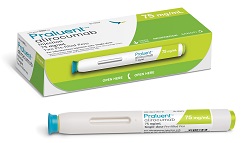It's not cardiovascular outcomes data, but it's outcomes data nonetheless. Sanofi ($SNY) and Regeneron's ($REGN) PCSK9 contender Praluent helped patients with a severe form of high cholesterol cut back on pricey and cumbersome aphaeresis treatments, new late-stage study data show.
 One in a suite of Praluent trials, the Odyssey Escape study focused on patients whose bad cholesterol (LDL) levels are so high, they require a special treatment to pull it from their blood. Patients who needed weekly or biweekly aphaeresis saw the frequency of those treatments reduced by 75% when they added Praluent to their regimens, compared with patients in the placebo arm.
One in a suite of Praluent trials, the Odyssey Escape study focused on patients whose bad cholesterol (LDL) levels are so high, they require a special treatment to pull it from their blood. Patients who needed weekly or biweekly aphaeresis saw the frequency of those treatments reduced by 75% when they added Praluent to their regimens, compared with patients in the placebo arm.
Almost two-thirds of patients (65%) in the Praluent group no longer needed aphaeresis at all, while none of the placebo patients could stop the treatments, the companies said.
The 62-patient trial ran for 18 weeks in the U.S. and Germany, where LDL aphaeresis is more common, Sanofi said. Patients stayed on their usual treatment schedules for the first 6 weeks. After that, they underwent aphaeresis only as their LDL levels demanded.
"This is the first time a PCSK9 inhibitor has shown in a clinical study that it reduced the frequency of apheresis therapy, an invasive, difficult to access, time-consuming and expensive treatment for some of the most difficult-to-treat patients," Regeneron VP Bill Sasiela said in a statement.
Aphaeresis costs up to $100,000 in the U.S. and €60,000 in Germany, and the treatments can take up to three hours. Praluent's performance in the trial could theoretically persuade doctors--and payers--that the new drug is worth its $14,000-per-year price in patients who need aphaeresis treatments.
Given that these are the patients most likely to use Praluent already--or its rival, Amgen's ($AMGN) Repatha--the impact is likely to be small. Where uptake is slowest and payer coverage most restricted is in patients with garden-variety high cholesterol who haven't responded to intensive statin therapy. That's obviously a much larger group. Even bigger is the group who don't tolerate statins, and both drugs aren't yet approved for that population.
Some doctors aren't convinced that they should adopt PCSK9 drugs in a broad way, which is where Sanofi and Regeneron's other Odyssey trials come in. Their Odyssey Outcomes trial is testing Praluent's ability to prevent heart attacks, strokes and cardiovascular death. The benefits seem logical, because the statin class of cholesterol meds have proven clinically effective.
But without PCSK9 data, payers won't be convinced, and nor will skeptical physicians, analysts say. Amgen's own outcomes trial with Repatha is likely to produce top-line data later this year, with Sanofi and Regeneron's Odyssey Outcomes study on Praluent wrapping up sometime in 2017.
To turn things around, the outcomes data will need to be quite strong--really strong, Leerink Partners analysts recently said, citing payers. To change payers' stance and to really boost adoption of the drugs, they'll need to see "substantial benefit in the outcomes trials, including overall survival," Leerink said. What's substantial? "[C]loser to 50% than 25%," Leerink's Geoffrey Porges quoted them as saying.
Regeneron CEO Len Schleifer thinks that's not unlikely. At Leerink's conference, Schleifer said he "believes that a much greater effect size is likely, and anticipates the outcomes improvement will be proportional to the absolute LDL reduction," Porges wrote in a recent investor note.
- see the release from Sanofi
Special Report: Top 15 pharma companies by 2014 revenue - Sanofi - Amgen | 10 top drugs in biopharma's late-stage pipeline - Alirocumab